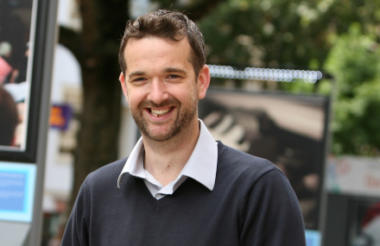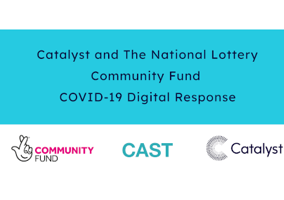One consequence of the coronavirus pandemic, and particularly social distancing and lockdown restrictions, is that charities have started experimenting much more with digital tools.
With many face-to-face activities on hold indefinitely, charities have had to rethink how they might deliver services digitally, with many of them going digital for the first time.
For Dan Sutch, director of the Centre for Acceleration of Social Technology (CAST), this is incredibly exciting, and affords charities an opportunity to build a more resilient, impactful sector.
“A large part of our work was working with charities to help them understand the urgency and importance of digital,” he says. Despite an increasing body of evidence, “the charity sector wasn’t responding as much as we thought to these sorts of things”.
This meant that the digital economy was continuing to expand and develop with little input or engagement from the charity sector. For example, there are over 250,000 mental health apps (downloaded 3.2bn times), but very few of them created by UK charities.
Then Covid-19 happened.
“Almost overnight, Covid kind of put a stop to that [the need to convince charities to embrace digital],” Sutch says. “Within two weeks of lockdown, we had just huge demand from charities saying how can we use digital to continue our businesses, to access files and to just run organisations?’
“And then about two weeks after that, we have this swell of demand for ‘how we put our stuff online so we can still be accessible when our physical locations are closed’.”
The third stage, he says, was charities starting to think about how they could “do it well”.
“It’s almost like a two-year ambition that came within two months,” he says. “It was incredible.”
Catalyst
CAST is now five years old. It was set up “specifically to help other social sector organisations to understand and to use digital”, and to “respond to how other people are using digital in their day-to-day lives”, Sutch says.
This is vital because people’s behaviour and expectations have changed dramatically in the last decade.
However, it’s not something that CAST alone can do, so about a year ago it was involved in the launch of Catalyst – a partnership involving the Department for Digital Culture, Media and Sport (DCMS) and five funders: The National Lottery Community Fund (NCLF), Comic Relief, the Esmée Fairbairn Foundation, the Paul Hamlyn Foundation and the City British Trust.
“This was just to spend time trying to figure out how we could support a sector-scale change around digital,” he says.
As the “incubator” of Catalyst, CAST has been working with hundreds of partners with the aim that over five years, it will get 2,500 charities “to respond to this massive change in digital and take more ownership of how digital can be used to improve people's lives”.
In the first year it worked with 800 charities and 50 trusts and foundations, “trying to figure out how they can kind of work best together”.
This has involved hosting “design hops” to help charities to understand digital design approaches, and working with trusts and foundations to help them understand how to fund digital projects at charities.
Last week it announced a new fund with NLCF that will support charities to increase their digital capability.
Through this, Sutch hopes “we can get charities who are particularly affected by Covid” and “really intentionally design how we want our charities to act from 2021 onwards, by testing new approaches now”.
He adds: “If we can hit 2021 with some new approaches and tests, then I think we're in a really strong position to rebuild a more resilient sector.”
Digital services often look very different to physical services
Digital experts place a lot of weight on the design process, and the “discovery” phase of a digital project, to understand how they might operate best and how they might differ from traditional services.
“Very often the physical thing and the online thing are very, very different. But they're both hitting the same objectives.”
Sutch cites Action for Children’s Parent Talk as a project which started as a physical service and was then replicated as a digital option.
“They started it because children's centres are closing down,” he says. “But rather than just think about the activities you do within your centre and get those online, you really focus on what's unique about children’s centres, and that was providing informal expert support to parents.”
‘The genie is out of the bottle’
Is he worried that as restrictions on face-to-face services lift and things can return to some sort of normality, enthusiasm for digital will wane? Ultimately no, he says, as “the genie is out of the bottle”.
“My hope is that there'll be a really intentional review of where digital has added to the work of charities and what from the old world we want to bring back,” he says.
Charities have often been accused of being behind other sectors on digital, but Sutch suggests it’s more appropriate to think about how people’s expectations have changed.
“Now we've seen fundamentally how those have changed over the past 10 years,” he explains. “We look for information resources differently.
“So fundamentally, if the sector doesn't respond to that, then we're not going to be as relevant. We know, there's a huge funding challenge, post Covid; if charities can't respond to how people are looking for information support and how they want services to be delivered, then I really fear for them.
“That said, I'm really hopeful that those who do want to respond to those behaviours and needs are in a really good place to provide incredible knowledge, insight and support.”
Why not earlier?
The charity sector has a reputation for being behind the curve when it comes to embracing digital working, and Sutch says there are a number of reasons why it has not, collectively, moved more quickly.
Firstly, he cites issues around the “funding landscape” and the ever-present tension between spending directly on the cause and investing in the organisation.
“We’re so good as a sector at putting as much money as we can towards the front line, that investing in our capacity and building our organisations isn't often prioritised,” he explains.
Other challenges include “the speed of this change”, making it difficult for those with established ways of working to adapt. “Often it's younger organisations that start using these processes; older organisations find it more difficult, sometimes, to start using digital.”
Finally, he says the sector’s focus on “human connections” within communities made it difficult for some to grasp what digital could add to that.
‘Our voice has been missing from discussions about ethics’
Truly understanding digital technology is not just about making organisations, and the sector, more efficient and effective; it is about power.
This goes to the heart of the sector’s overall purpose – giving a voice, and power, to those without and making sure it is heard by those who hold power. Today the holders of power very much include technology companies.
However, Sutch says: “Charities haven't had a really strong voice in the way that all these [online] civic spaces have been built.”
Crucially though, it is not too late to catch up.
“What I'm expecting is that as charities become more confident in digital, they have more of an understanding of its impact, and we'll have more of a voice,” Sutch says.
Traditionally charities have lobbied governments and private companies, seeking, and obtaining, changes that improve the lives of many.
Sutch says: “Charity leaders need to do that to technology owners and technology providers to ensure we're representing those who are furthest from power.”
He says influencing and representing people is “something that we're good at”, and says that the sector's focus on relational engagements means “we focus on the ethics and unintended consequences”.
He adds: “As we understand this stuff more, we can be more confident in ensuring we represent our communities. And that's the voice has been missing in so much technology.”
Editors note - 3 September
This article original stated that there were over three billion health apps available online. This has been corrected to: 250,000 mental health apps (downloaded 3.2bn times).
Related articles












